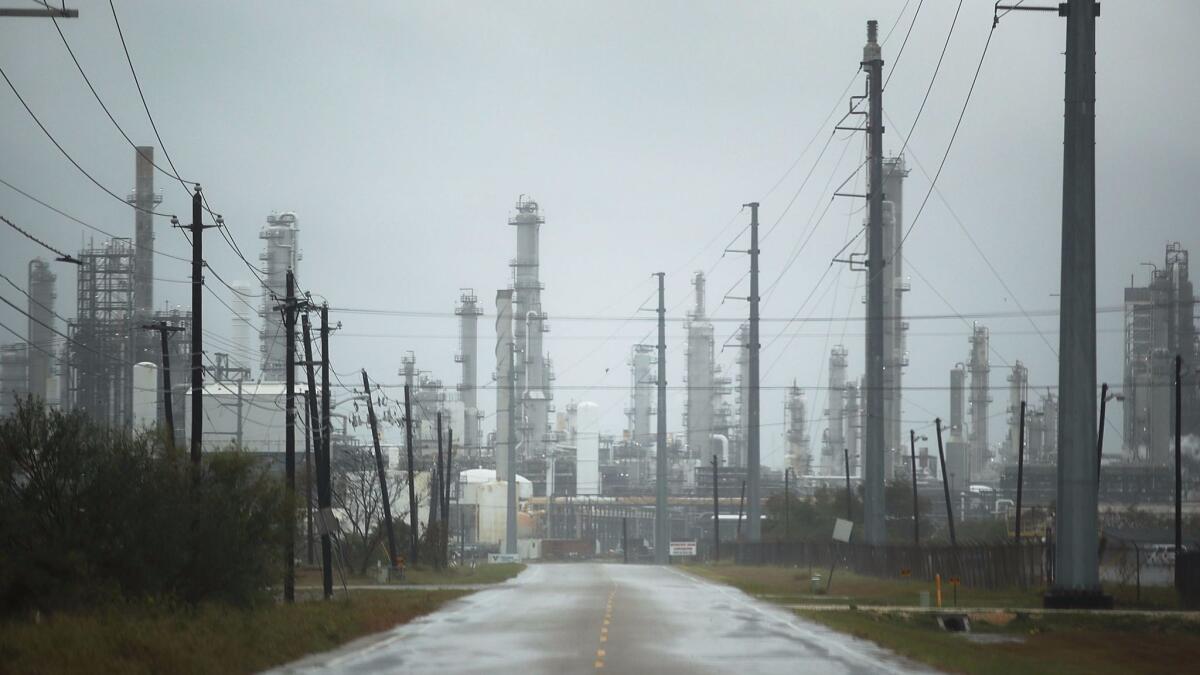Harvey has knocked out a significant portion of the nation’s oil refining capacity

- Share via
The nation’s biggest oil refinery shut down Wednesday morning as Tropical Storm Harvey continued to hammer the core of the U.S. industry that turns crude oil into gasoline.
The Motiva refinery in Port Arthur, Texas, began a “controlled shutdown” at 5 a.m., joining more than a dozen facilities in Corpus Christi, Beaumont and other cities along the Gulf Coast that have halted or scaled back operations as Harvey wreaked havoc in the greater Houston area.
The storm’s record rainfall has already reduced U.S. oil production capacity by nearly a fifth, a figure that analysts said could still rise. The Houston-Galveston area could see a loss in refining capacity of more than a million barrels a day.
Lasting closures or damage to Gulf Coast facilities could lead to a long-term increase in gasoline prices, experts said. How high prices will rise will depend on how badly the facilities are damaged in the storm and how quickly they can reopen.
At least one facility, a processing plant owned by Arkema Inc. in the small town of Crosby, will probably face an “intense fire” caused by more than 6 feet of flooding that knocked out the electricity supply, the company’s chief executive, Rich Rowe, said Wednesday.
Without electricity, chemicals stored on-site cannot be refrigerated and will probably explode, he said in a statement.
The company evacuated its workers, and Harris County ordered evacuations in a 1.5-mile radius of the plant, which is northeast of Houston. Federal aviation officials temporarily barred flights from passing over the area because of the risk of explosion.
In the last decade, oil and gas production along the Gulf Coast has surpassed the boom of the 1970s, spurred by the use of horizontal drilling and hydraulic fracturing. The area from Corpus Christi to Lake Charles, La., now represents nearly half of the country’s refining capacity.
“The fall is longer if the cliff is higher,” said Michael Webber, deputy director of the Energy Institute at the University of Texas at Austin. “The energy sector here is more important than it was a decade ago, which means it’s more of a calamity.”
In cities like Beaumont and Port Arthur, a significant share of the workforce is employed in petroleum and chemical processing, Webber said.
“There are refinery towns, chemical towns,” Webber said. “Their fate is tied to the energy industry.”
Offshore oil and gas operators evacuated their workers from 102 of the gulf’s 737 manned platforms, the U.S. Bureau of Safety and Environmental Enforcement said.
The Motiva facility, which is owned by Saudi Arabia’s state oil company, had scaled back production multiple times as Harvey approached. Under normal conditions, the facility processes more than 600,000 barrels of crude oil a day.
The decision to temporarily shut down the Motiva refinery follows Exxon Mobil’s discovery of damage at its Baytown facility, which is the nation’s second largest. The plant on the Houston Ship Channel employs about 7,000 people and can process up to 584,000 barrels of crude oil a day.
A roof at the facility “partially sank” under heavy rain, and chemicals could be released into the air, the company said in a filing to Texas environmental regulators. The company wrote that it was working to “minimize emissions.”
The refineries shutting down could have a “cascade effect” on production, Webber said, because companies in other parts of Texas and across the country will have fewer places to ship their crude oil for processing.
In anticipation of a fuel shortage, the Environmental Protection Agency on Wednesday issued two-week waivers for a dozen states and the District of Columbia to allow the sale of gasoline that does not comply with clean air laws.
Refineries in those states, which include Texas and Louisiana, will be allowed to sell so-called winter fuel, which is cheaper and easier to produce but creates more ozone pollution. The Clean Air Act requires that states sell gasoline that is mixed differently in the summer.
EPA Administrator Scott Pruit explained his reasoning for granting the waivers in a letter, writing that the fuel shortage was “not attributable to a lack of prudent planning.”
The Colonial Pipeline, which delivers gasoline from Texas to the Northeast, has been running at reduced capacity for days because of limited supply from Houston-area refiners, according to the research firm S&P Global Platts.
Federal officials took similar action in 2008, when gasoline shortages rippled across the southeastern U.S. after hurricanes Gustav and Ike reduced gulf oil production.
UPDATES:
3:31 p.m. This article was updated to include a quote from EPA Administrator Scott Pruitt and to add information on a processing plant in Crosby facing a fire or explosion.
This article was originally published at 2:30 p.m.
More to Read
Sign up for Essential California
The most important California stories and recommendations in your inbox every morning.
You may occasionally receive promotional content from the Los Angeles Times.










